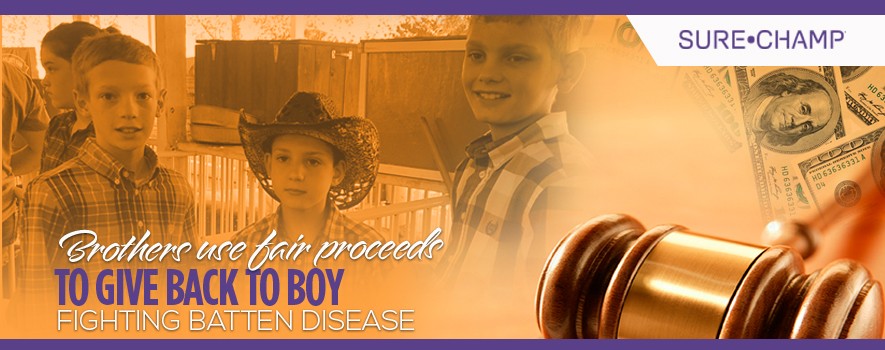
“To make the best better” is the long-time motto that young people enrolled in 4-H clubs across America have been reciting for generations. And in Rock County, Wisconsin, at the recent 4-H livestock sale, two brothers decided to contribute some of their sale proceeds from their livestock projects to help find a cure for their friend’s disease.
Dalton Bennett said he came with the idea to donate part of his sale proceeds from his market swine project to his friend, neighbor and former classmate, Brock Scarpetta, who is fighting a rare neurological disorder called Batten disease. Batten disease is a fatal, inherited disorder of the nervous system that typically begins in childhood.
“Brock is a year younger than us, and I want to help him find a cure so he can live a normal life like other people,” Dalton said.
And when Dalton came up with this idea, his 11-year-old twin brother Logan agreed, and wanted to join him so Brock can have the “rest of his life.”
“As a parent, you hope you’re doing the right things raising your kids,” said Charlie Bennett, dad to the brothers. “When an 11-year-old comes up with an idea like that, you know you are doing something right.”
Charlie ran the idea by Brock’s parents for approval, and once they approved, he talked to the fair superintendent so an announcement about the fundraiser could be made from the auction block.
Logan said it is typically emotional to load out his hogs in the trailer after they are sold because he does spend so much time working with them through spring and summer. However, with part of his sale proceeds going toward his friend, it eased his own sadness just a little this year.
“I think if you were that way, you’d want a cure, but you wouldn’t be able to say it because you can’t talk very much,” Logan said.
Early symptoms of Batten disease usually appear between the ages of 5 and 10 years, when parents or physicians may notice a previously normal child has begun to develop vision problems or seizures. In some cases, the early signs are subtle, taking the form of personality and behavior changes, slow learning, clumsiness or stumbling. Over time, affected children suffer cognitive impairment, worsening seizures and progressive loss of sight and motor skills. Eventually, children with Batten disease become blind, bedridden and demented. Batten disease is often fatal by the late teens or twenties.
There is currently no cure for Batten disease; however, the Scarpettas would like to pursue gene therapy for Brock to keep some of the symptoms at bay. Insurance won’t pay for the therapy that costs approximately $2 million.
Dalton and Logan are both enrolled in the swine project in 4-H. Dalton also participates in drawing and Logan in beef. They both agree that the best thing about 4-H is meeting new people and making friends.
“If you get along well with the people you meet in 4-H and work on projects with, you are going to do well,” Dalton said.
And at 11, perhaps the Bennett brothers have learned the most important thing they will learn – trophies and ribbons tarnish and fade, but helping others never, ever gets old.
“I felt good to help Brock’s family. I did a lot of work with my pigs and it paid off,” Dalton said.
Logan and Dalton Bennett contributed nearly $3,000 to Brock Scarpetta and his cause for a cure. In addition, they inspired other 4-H youth to donate to Brock with some of their animal sale proceeds that day.
If you would like to learn more about Brock or Batten disease or help give to his cause, visit cowboyforacause.com.

